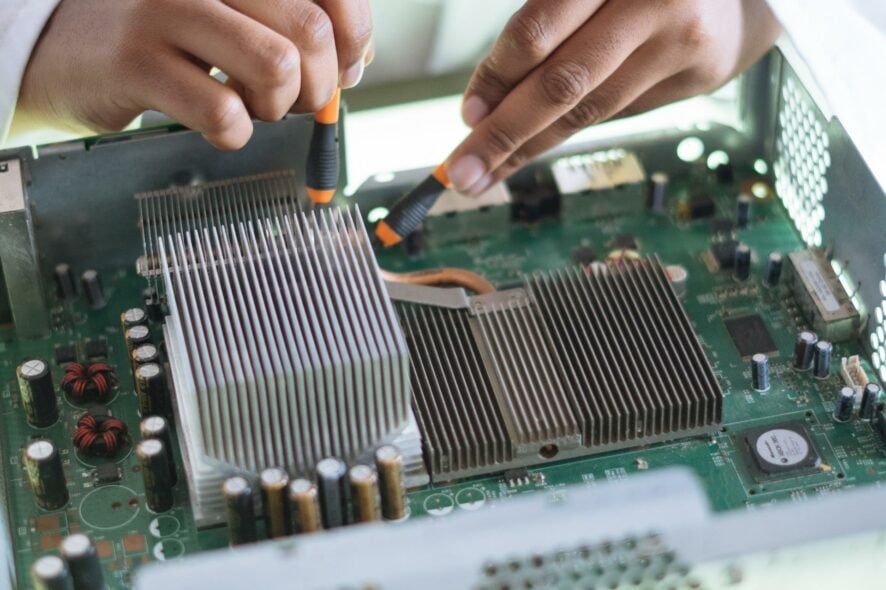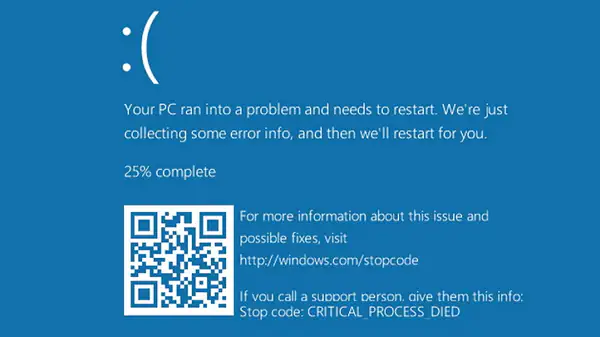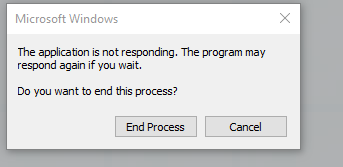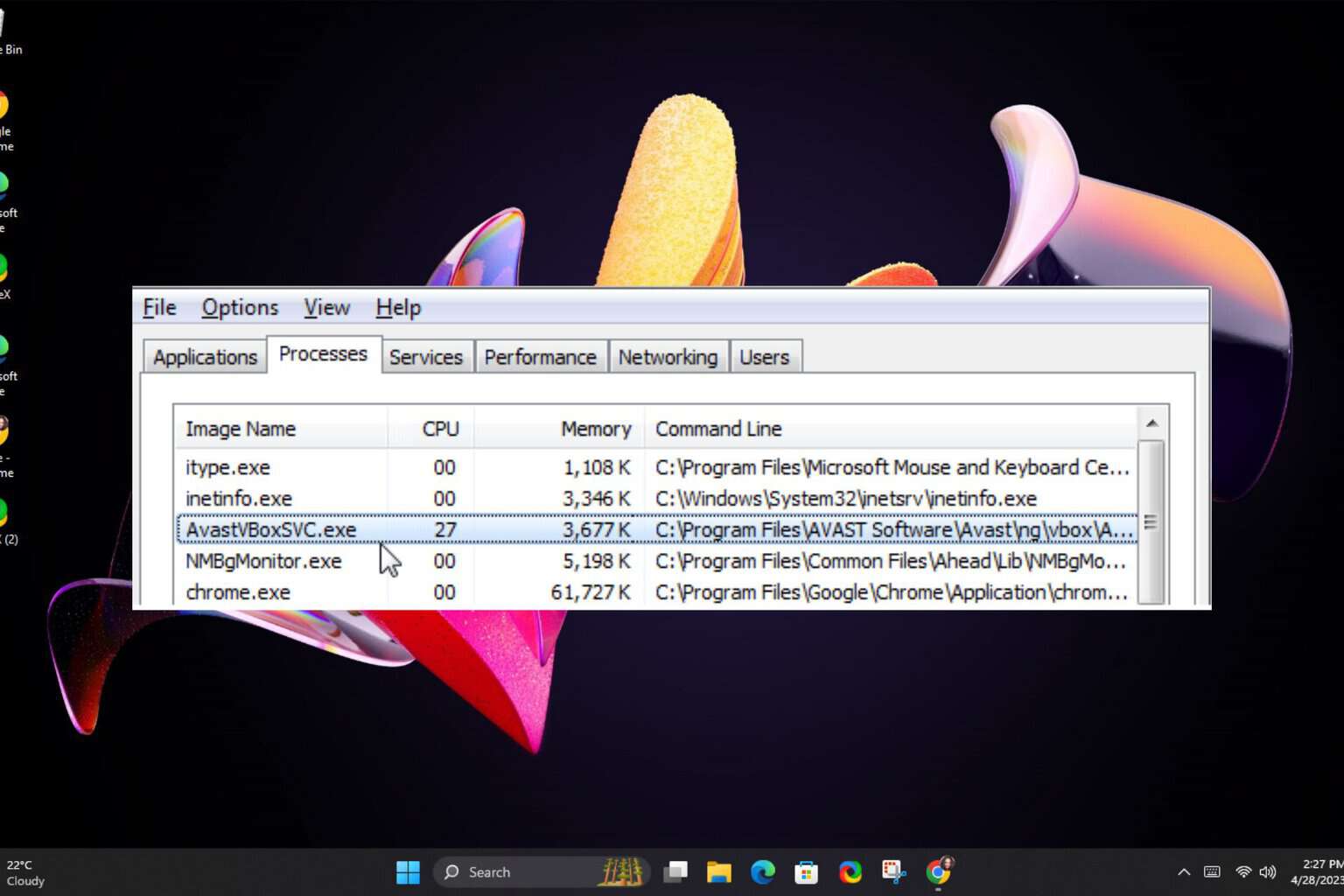What are the Signs of CPU Failure & What Can You Do?
Here's what a CPU on it's deathbed looks like
7 min. read
Updated on
Read our disclosure page to find out how can you help Windows Report sustain the editorial team Read more
Key notes
- Man-made hardware such as CPUs are great but after some time, they will deteriorate and their performance will decline significantly.
- To prevent surprise, you need to look out for CPU failure symptoms so that you can arrange for a replacement before it's too late.

The CPU is often likened to the human brain in terms of the work it does on your PC. As such, it’s a very important component that should be kept healthy at all times. While good maintenance will extend the lifespan of your CPU, you cannot escape from the inevitable wear and tear.
At some point, your CPU will show failure symptoms, especially if you get high CPU usage messages from time to time. In this article, we let you in on some of the symptoms to look out for so that you can be prepared.
How do I know if my CPU is failing?
CPU failure is a very serious situation. It can be caused by many factors, but the most common is overheating.
If you have a dead CPU, there are many things that can go wrong in your computer system – from slow performance to total system failure. If you suspect that your CPU is on the brink of collapsing, try the following steps to help determine whether or not it’s time for a new one:
- CPU temperature – This is a classic CPU failure symptom. If the temperature is abnormal, you need to check the CPU temperature just to be sure.
- Warning messages – If you keep getting notified that your CPU is overheating or advised to shut down while working on your PC, your CPU doesn’t have much time.
- Dust and corrosion – Dust is a major factor in overheating because it gets inside the computer and prevents heat from dissipating out through the vents. It can make your fan extremely loud.
- Physical damage – Corrosion is visible and builds up over time, so if there has been no use for the CPU for a while, it probably has some corrosion built up inside which is interfering with its operation.
- Software corruption/crash/failure – This is a common cause of CPU failures as software bugs and errors can cause a lot of damage to your computer’s hardware components including the motherboard and even your whole computer system.
What happens when the CPU fails?
CPU failures are usually caused by overheating, dust and corrosion. Overheating is the most common cause of CPU failure. The CPU is designed to operate within certain temperature limits. When the temperature reaches a certain point, it causes the CPU to fail.
The first thing that happens when the CPU fails is that it crashes. While you can take steps to lower high CPU temperatures, sometimes, your CPU is beyond help. Your PC will make a short series of sounds and then shut down. It’s a pretty dramatic way to go, but it happens fast.
Most modern computers are designed to be tolerant of crashes. They can be restarted, and they will continue running without missing a beat. But there’s a limit to how much they can tolerate before they start breaking down.
If it happens often enough, your operating system may have been scrambled by whatever happened. Some signs such as apps freezing, random shutdowns, slow boot time, and a generally deteriorated performance indicate that you may need a new CPU.
What are the signs of a dead CPU?
1. High CPU temperature
A high CPU temperature is not always due to overheating problems but could also be caused by other issues such as bad cooling or defective fans. When the CPU heats up too much, it will have an impact on system performance and cause errors.
The first sign of a dead CPU is high CPU temperature. You can install CPU monitoring software to ensure the temperatures don’t go beyond the recommended limit and keep your PC healthy.
2. It won’t boot up
If the computer continues to boot, but then shuts down again, this could be a CPU failure symptom. For laptops, even when fully charged, it may be slow in booting.
You may have to hold down the power button for a few seconds before your computer will turn on. This could be due to a bad keyboard cable or faulty battery, but it could also be a dead CPU symptom and needs to be replaced immediately.
3. Random shutdowns
When a computer’s CPU is dying, it can cause various problems with the system. This can include random shutdowns caused by overheating. Random PC shutdowns can be very annoying because they often occur at inopportune times.
You may be working on a project and need your computer to stay online but it just shuts down. If you’re experiencing this problem, your CPU might just be on its death bed and you need to start thinking of getting a new one.
4. Abnormal behavior from the CPU fan
When you notice your CPU fan isn’t spinning as fast as it used to, it’s a good sign that your CPU is dead. If your CPU fan slows down, then the heat generated by your CPU can’t escape through the heat sink and dissipate.
This can eventually lead to severe overheating and damage to the motherboard or other components. If the fan doesn’t spin at all, it may have burned out, or it could be something more serious like a faulty power supply. Always check your fan speed to ensure it is at optimum levels.
5. Inability to use several applications simultaneously
When you open multiple applications or programs at once, your CPU may overload with all the data. This often causes the system to slow down and eventually crash. If this happens frequently, it could be an indication that something is wrong with your CPU or motherboard.
You’ll find that you can’t play games or use several applications at once without experiencing lag time or slow-down issues.
This is because your computer will not be able to handle its full potential when using multiple applications simultaneously. It will usually freeze up when using certain applications and eventually shut down.
Can I fix a CPU failure?
CPU failure is a common issue with computers and laptops, especially if you use the computer for long hours. When a CPU fails, it can be hard to tell if it’s actually broken or if the problem is somewhere else.
If you want to salvage whatever little life is remaining from your CPU, proceed to do the following:
- Clean your CPU – You can use a vacuum cleaner to blow out dust from inside the CPU.
- Disable overclocking – If you have a CPU that is overheating, then it might be time to disable overclocking. Overclocking can cause your CPU to overheat, or it could also damage your processor.
- Replace your CPU fan – If your PC is overheating, then you need to replace its fan or get a CPU cooler. You should also check whether there are any cracks in the fan casing. These can cause the fan to stop working completely.
- Upgrade your CPU – A healthy computer is one that has all its components working together properly and in order. If your CPU has reached its end of life, you need to get a new CPU.
Also, CPU cleaners can help you with the efficient resource management of your CPU so that it isn’t overworked. Hopefully, you now know what signs indicate CPU failure and take the necessary steps to ensure you keep yours for as long as possible.
Let us know what tips you use to keep your CPU in good shape in the comment section below.











